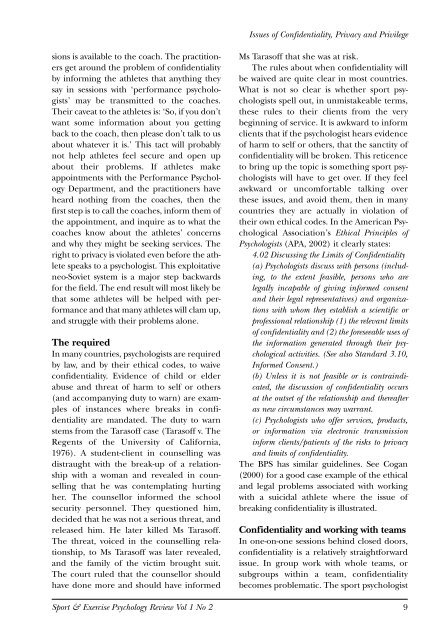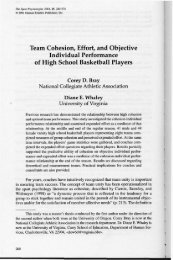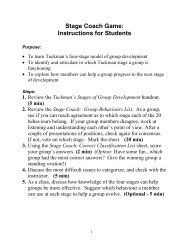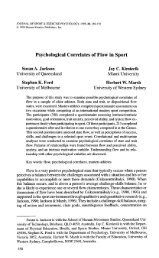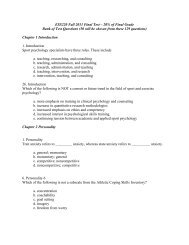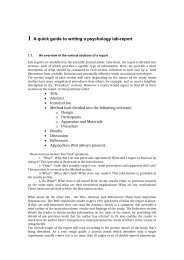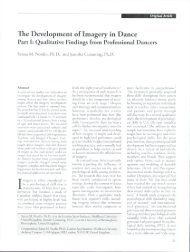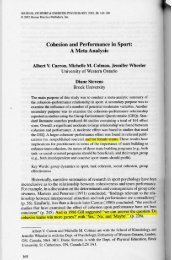Sport and Exercise Psychology Review - Sport Psychology Goes to ...
Sport and Exercise Psychology Review - Sport Psychology Goes to ...
Sport and Exercise Psychology Review - Sport Psychology Goes to ...
You also want an ePaper? Increase the reach of your titles
YUMPU automatically turns print PDFs into web optimized ePapers that Google loves.
Issues of Confidentiality, Privacy <strong>and</strong> Privilege<br />
sions is available <strong>to</strong> the coach. The practitioners<br />
get around the problem of confidentiality<br />
by informing the athletes that anything they<br />
say in sessions with ‘performance psychologists’<br />
may be transmitted <strong>to</strong> the coaches.<br />
Their caveat <strong>to</strong> the athletes is: ‘So, if you don’t<br />
want some information about you getting<br />
back <strong>to</strong> the coach, then please don’t talk <strong>to</strong> us<br />
about whatever it is.’ This tact will probably<br />
not help athletes feel secure <strong>and</strong> open up<br />
about their problems. If athletes make<br />
appointments with the Performance <strong>Psychology</strong><br />
Department, <strong>and</strong> the practitioners have<br />
heard nothing from the coaches, then the<br />
first step is <strong>to</strong> call the coaches, inform them of<br />
the appointment, <strong>and</strong> inquire as <strong>to</strong> what the<br />
coaches know about the athletes’ concerns<br />
<strong>and</strong> why they might be seeking services. The<br />
right <strong>to</strong> privacy is violated even before the athlete<br />
speaks <strong>to</strong> a psychologist. This exploitative<br />
neo-Soviet system is a major step backwards<br />
for the field. The end result will most likely be<br />
that some athletes will be helped with performance<br />
<strong>and</strong> that many athletes will clam up,<br />
<strong>and</strong> struggle with their problems alone.<br />
The required<br />
In many countries, psychologists are required<br />
by law, <strong>and</strong> by their ethical codes, <strong>to</strong> waive<br />
confidentiality. Evidence of child or elder<br />
abuse <strong>and</strong> threat of harm <strong>to</strong> self or others<br />
(<strong>and</strong> accompanying duty <strong>to</strong> warn) are examples<br />
of instances where breaks in confidentiality<br />
are m<strong>and</strong>ated. The duty <strong>to</strong> warn<br />
stems from the Tarasoff case (Tarasoff v. The<br />
Regents of the University of California,<br />
1976). A student-client in counselling was<br />
distraught with the break-up of a relationship<br />
with a woman <strong>and</strong> revealed in counselling<br />
that he was contemplating hurting<br />
her. The counsellor informed the school<br />
security personnel. They questioned him,<br />
decided that he was not a serious threat, <strong>and</strong><br />
released him. He later killed Ms Tarasoff.<br />
The threat, voiced in the counselling relationship,<br />
<strong>to</strong> Ms Tarasoff was later revealed,<br />
<strong>and</strong> the family of the victim brought suit.<br />
The court ruled that the counsellor should<br />
have done more <strong>and</strong> should have informed<br />
Ms Tarasoff that she was at risk.<br />
The rules about when confidentiality will<br />
be waived are quite clear in most countries.<br />
What is not so clear is whether sport psychologists<br />
spell out, in unmistakeable terms,<br />
these rules <strong>to</strong> their clients from the very<br />
beginning of service. It is awkward <strong>to</strong> inform<br />
clients that if the psychologist hears evidence<br />
of harm <strong>to</strong> self or others, that the sanctity of<br />
confidentiality will be broken. This reticence<br />
<strong>to</strong> bring up the <strong>to</strong>pic is something sport psychologists<br />
will have <strong>to</strong> get over. If they feel<br />
awkward or uncomfortable talking over<br />
these issues, <strong>and</strong> avoid them, then in many<br />
countries they are actually in violation of<br />
their own ethical codes. In the American Psychological<br />
Association’s Ethical Principles of<br />
Psychologists (APA, 2002) it clearly states:<br />
4.02 Discussing the Limits of Confidentiality<br />
(a) Psychologists discuss with persons (including,<br />
<strong>to</strong> the extent feasible, persons who are<br />
legally incapable of giving informed consent<br />
<strong>and</strong> their legal representatives) <strong>and</strong> organizations<br />
with whom they establish a scientific or<br />
professional relationship (1) the relevant limits<br />
of confidentiality <strong>and</strong> (2) the foreseeable uses of<br />
the information generated through their psychological<br />
activities. (See also St<strong>and</strong>ard 3.10,<br />
Informed Consent.)<br />
(b) Unless it is not feasible or is contraindicated,<br />
the discussion of confidentiality occurs<br />
at the outset of the relationship <strong>and</strong> thereafter<br />
as new circumstances may warrant.<br />
(c) Psychologists who offer services, products,<br />
or information via electronic transmission<br />
inform clients/patients of the risks <strong>to</strong> privacy<br />
<strong>and</strong> limits of confidentiality.<br />
The BPS has similar guidelines. See Cogan<br />
(2000) for a good case example of the ethical<br />
<strong>and</strong> legal problems associated with working<br />
with a suicidal athlete where the issue of<br />
breaking confidentiality is illustrated.<br />
Confidentiality <strong>and</strong> working with teams<br />
In one-on-one sessions behind closed doors,<br />
confidentiality is a relatively straightforward<br />
issue. In group work with whole teams, or<br />
subgroups within a team, confidentiality<br />
becomes problematic. The sport psychologist<br />
<strong>Sport</strong> & <strong>Exercise</strong> <strong>Psychology</strong> <strong>Review</strong> Vol 1 No 2 9


